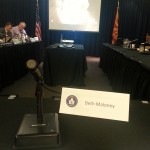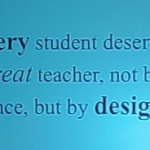In 2010, the AZ State Legislature ended funding for a program called the Early Childhood Block Grant [ECBG]. The loss of money was a devastating blow to many school organizations. In the district where I worked, the ECBG funds were supporting an inclusive preschool program where non-disabled children attended for a low cost alongside students with special needs (who attended for free). When my district got the news, they called a meeting for preschool staff and made an announcement: They were closing the inclusive preschool immediately. It was crushing. Fifty children without school. Four teachers out of work. As a special education teacher, I was lucky to keep my job and teach a small class of remaining students with special needs. But my students would not have any appropriate peer role models. Devastating.
Preschool advocates planned a statewide day of action the following week at the Arizona State Capitol. I took the day off and attended my very first education rally. Organizations called for teachers to write letters asking the legislature to reinstate the ECBG, so I reached out to my colleagues who were losing their jobs. I was shocked to discover that NO ONE would write a letter. Perhaps they thought their letters wouldn’t make a difference. Perhaps they were too busy looking for another job. For whatever reason, they decided not to fight. Eight years later, things feel different for teachers in our state. Getting involved in politics is finally getting trendy.
I’ve been reading a book called The Teacher Wars: A History of America’s Most Embattled Profession by Dana Goldstein. I heard an interesting interview when Goldstein first published the book in 2014. At that time, I found the title startling. It’s hard to accept the possibility that teachers are “embattled” because it’s hard to believe there are enemies fighting against adequate, equitable education for America’s youth. Over the past years, I’ve come to realize that it’s naïve to dismiss the ongoing war against public education in our state. The good news is: There is fire in the hole.
In this last election cycle, teachers were engaged and informed about issues and candidates. Many of my colleagues actively campaigned for candidates they supported, spoke out about issues that mattered most, and published blogs encouraging others to get involved. Our state witnessed many teachers run for public office. Education was a common topic in debates, political ads, and mailers—in fact, it got confusing because everyone claimed to be pro education candidates. When teachers started mailing their ballots, they took pictures and posted them on social media encouraging others to vote. I don’t remember seeing these types of efforts to get out the vote in years past. If this is a war, we’ve got more soldiers on the front-line than ever before.
I was curious if others feel this same shift, so I reached out to teachers on social media and asked, How are you different today compared to previous elections? Have you changed?
Here are three responses from Arizona teachers that sum up some key points:
“I have always voted pro education and been very passionate about voting; however my stance had always been to keep quiet about who I was voting for, thinking it was a personal decision. This year, I have been much more vocal about who/what I am voting for and will give my opinion in political discussions.” -Jen Martin
“I have certainly changed since the last election. I can’t say one particular thing made me more engaged, but I have changed. I am much more willing to correct misunderstandings or myths non-educators speak of such as “teachers have summers off” or “ they only work until 3.” I have found more often than not when I address these misunderstandings, people were shocked and saddened they had been misled to believe inaccuracies.” -Cara Cosentino, NBCT
“I used to feel apathetic because I didn’t realize my actions could ever impact the way public education is valued and funded. Now I feel empowered and fired up. Over the past year, I have seen again and again the amazing power of ordinary citizens who unite…I am excited for the future of this state.” -Kristin Roberts, NBCT
We have most certainly begun a movement, and we must continue. Educators are engaged, the community is interested in our opinions, and we have a chance to forge alliances with the newly elected men and women who have campaigned as pro-education candidates. Let’s keep the dialogue going out there and hold them accountable to their promises. There is much work to be done.
Goldstein writes, “For two hundred years, the American public has asked teachers to close troubling social gaps…yet every new era of education reform has been characterized by a political and media war on existing teachers upon whom we rely to do this difficult work.” We may face challenges in the war to bring adequate funding and resources to kids in Arizona, but do not be discouraged about the fight. We are making gains in this work, the community is paying attention, and the kids are worth it! Fire in the hole!
Image credit: https://www.pexels.com/photo/man-with-fireworks-769525/










Comments 13
I loved the title of this article. You’re right the political appropriateness to discuss issues outwardly has drastically changed recently. I remember 10 years ago when I started working in education that you didn’t talk about education problems. It was like when you’re in fight club, you don’t talk about fight club. Now the gloves are off and teachers are talking.
I love the way you worded this: The gloves are off We have no choice these days but to publicly discuss the issues that are defunding our schools and decreasing opportunities for students in Arizona to have success. I think the best way to use our voice is to make sure we keep it professional, informative, and classy. I wrote a little bit about that here
We have no choice these days but to publicly discuss the issues that are defunding our schools and decreasing opportunities for students in Arizona to have success. I think the best way to use our voice is to make sure we keep it professional, informative, and classy. I wrote a little bit about that here  https://leadfromintheclassroom.com/2018/10/28/stay-classy-teachers/
https://leadfromintheclassroom.com/2018/10/28/stay-classy-teachers/
Fight club. That’s true. Ten years ago, it would have felt like putting your neck out there, not being sure that colleagues would back you up.
I agree with some of your teacher statements- this election brought me out of my shell in talking about who I was voting for and why. I asked some of my friends if they had voted and encouraged them to vote for pro-education candidates; something I would never have done before this. I have always been political and I love voting. I think the change was in trying to get others to realize the impact we can have on the government if we all work toward a common goal- a state that fully funds education. I’m still excited with the possibility of some more pro-education candidates getting elected as we await these final vote counts.
Yes, I completely agree Rachel! I think educators have also learned where the lines are so we feel more comfortable being out of our shell while also being honest advocates for public ed. Instead of keeping quiet because we don’t know what we are allowed to say, we are informed about appropriate things to say and not say now. I think education in AZ is absolutely going to benefit if teachers continue to share ideas about how we can support students and elect those who will join in the work. Thanks for the comment!
Awesome post, Jess. I think part of the power comes from that very real story– I can almost feel the gut punch in your first paragraph. Those first waves of huge cuts really hurt, but we didn’t have the political power or leadership capacity to do anything but feel like we were yelling into the wind. So many great metaphors to talk about this issue, btw!
Anyway, I am really glad you included that story because as we move forward and begin to make changes and improve funding, it is important to have those moments to share where the defunding of public education made such a real and significant impact.
I have been sad these last 8 years to see that true inclusion has never come back to preschool. Districts can’t afford it. Sure, we have things like Typical Peer Programs with reduced tuition for typical kids to attend Developmental Preschool classes (a reverse mainstream type model), but I would love to see districts have the financial support to offer inexpensive preschool experiences for typically developing children where we can include a few students with special needs (a real inclusion model). The Early Childhood Block Grant was so important to Arizona. Good things have been happening with the Preschool Development Grant, and I’m glad to see federal funding for this topic coming into our state. Hoping for more in the future.
Jess, I agree 100%. Teachers play so many roles as community members and they have had to become more than just passive voters. It is my hope that the next group to feel this fire in the hole is parents.
Yes, absolutely! I have been so happy to see parents in my community supporting #REDforED and understanding what it means to advocate for students and school funding. I’m saddened to see the communities that are finding rifts instead of connections between parents and schools. There is so much we can do together–and so much need to do it!
I love this post! It is very true that there is a shift in the engagement of all voters, especially teachers. I have been very vocal this election cycle, advocating, campaigning, and educating. It’s very new for me, but very empowering. There is a war against democracy and American education brewing in our country, apathy will not suffice!
Hi, Susan! It has been so inspiring to see how different educators have been involved. You are one who inspires me regularly It has been so interesting to learn about the issues and needs of rural schools. You have taught me much!
It has been so interesting to learn about the issues and needs of rural schools. You have taught me much!
Your quote by Dana Goldstein so resonated with me and is what I hear from a lot of non education friends and family members, they can’t believe there is truly a war on public education. I believe in recent years or even months more and more are starting to see that a change is needed and perhaps there is an issue.
Absolutely agree Amy! So glad to see our community getting involved!
So glad to see our community getting involved!